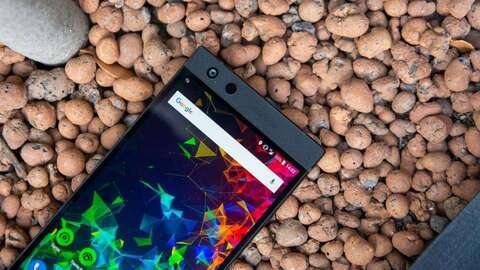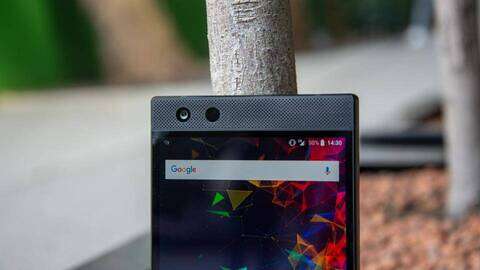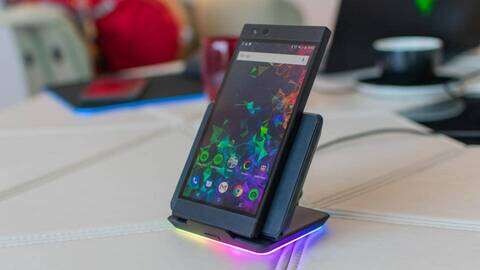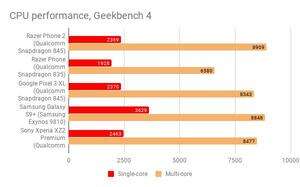Razer Phone 2 review: Price drops by £280
The year of incremental smartphone upgrades trudges along. With Samsung and Apple choosing subtle hardware upgrades over flashy new features, there’s a distinct lack of innovation in the 2018 smartphone market.
READ NEXT: The best smartphones you can buy today
So it is with the Razer Phone 2. Last year’s Razer Phone introduced a high-refresh-rate 120Hz display to smartphones for the very first time. Now, the Razer Phone 2 has entered the battlefield, but it tweaks last year’s formula only ever so slightly. In this case, though, its lack of noteworthy changes isn’t necessarily a bad thing.
Razer Phone 2 review: What you need to know
Despite a shortage of headline-grabbing changes, the Razer Phone 2 makes the same hard-hitting statement as last year’s model: there’s still space for a flagship gaming phone in your pocket.

The biggest upgrade is the introduction of Qualcomm’s Snapdragon 845 chip, which gives the new phone a decent performance bump over its 835-equipped predecessor and works alongside 8GB of RAM and 128GB of expandable storage. The main selling point, though, is still the 120Hz screen – a feature that remains unique to Razer’s smartphone offerings.
Razer Phone 2 review: Price and competition
The Razer Phone 2 is special, but at £779 SIM-free it’s pricey and is only available via Razer’s official website . You can also get a 24-month contract, but only on Three in the UK – which will cost you £47 a month with an upfront cost of £49 on the unlimited data plan.
At that price, the Razer Phone 2 faces plenty of competition. Perhaps its most obvious rival is Google’s recently-launched Pixel 3 , which features the best smartphone camera on the market. Apple’s iPhone XR is also a solid alternative if Android isn’t your thing. Neither of these phones has a 120Hz screen, though, so if that’s what you’re after, there’s simply no alternative.
Razer Phone 2 review: Design and key features
Let’s begin with a tricky game of spot the difference: the Razer Phone 2’s design has changed only slightly from last year’s model. Size and weight are practically identical at 198g and 159 x 79 x 8.5mm, and the phone still comes with brutally square corners that look ready to rip a hole straight through your pockets. A pair of speakers sit above and below the screen, just like last year, along with a solitary 8-megapixel f/2.0 selfie camera.

One invisible improvement is that the new phone is IP67 rated for dust- and water-resistance – and supports Qi wireless charging at rates of up to 11.25W.
At the rear, the dual-camera arrangement has shifted to the middle, and the back is coated in a layer of Gorilla Glass 5 for added protection against drops and scrapes. Beneath it, Razer’s three-headed snake logo illuminates the back of the phone, and you can customise this with a choice of 16.8 million colours – just as you can with Razer’s suite of RGB-driven PC gaming peripherals. You can also adjust the brightness for lower visibility in dark environments, or to give battery life a tiny boost.
The Razer Phone 2 isn’t lacking when it comes to the regular checklist features, either. You can add a microSD card to expand its 64GB of built-in storage, and there’s a fingerprint reader positioned sensibly on the right-hand side of the phone that does double duty as a power button. Finally, there’s a USB-C port at the bottom, supporting the Quick Charge 4 standard.
Razer Phone 2 review: Display
The original Razer Phone broke new ground with its 5.7in, 120Hz, 1,440 x 2,560 resolution IGZO LCD screen. The Razer Phone 2 matches those specs and adds a 10-bit panel, with enhanced colour accuracy and HDR improvements. It’s one mighty fine-looking smartphone screen.

Technically speaking, it's not quite as colour-accurate as the Pixel 3. Turning our X-rite colour calibrator loose on a review unit, I found an average Delta E of 2.46 (less than one is preferred) and a total sRGB coverage of 93.7% on the phone’s default “Boosted” colour mode. It looks lovely, though, with images that really burst out of the screen, especially HDR content on Netflix.
The contrast ratio is great at 1,819:1, ensuring that text and images look pin-sharp. And the Razer Phone 2’s screen is almost twice as bright as last year’s display, reaching a retina-blinding maximum brightness of 603cd/m ² .
Perhaps most importantly, the high refresh rate works flawlessly. Touching, scrolling and playing games feels more fluid than on any other phone available today. I didn’t encounter any compatibility issues, but if you do hit a glitch you can quickly knock the refresh rate down to 90Hz or a more standard 60Hz to ensure everything works as it should.
Razer Phone 2 review: Performance and battery life
As well as the screen, the internals have also been updated: Qualcomm’s current flagship processor, the Snapdragon 845, is running the show this time around, in place of last year’s 835 chipset and it’s partnered with a generous 8GB of RAM for multitasking and gaming.

As with other 845-equipped handsets, this delivers a serious performance boost: Geekbench 4’s rigorous duo of single- and multi-core CPU tests returned results of 2,369 and 8,909 respectively. At the time of writing, there’s simply nothing Android-based that’s much faster, so you can rest assured that the Razer Phone 2 will effortlessly handle any application you throw at it for a good few years to come.
What of mobile gaming? The Razer Phone 2 is billed as a smartphone for gamers and, with that top-end processor and 120Hz screen, it ought to offer an unbeatable experience, right?
Well, that’s true in theory. Performance is good of course, with GFXBench GL’s Manhattan 3.0 GPU test recording a perfect score of 60fps. The problem is to do with how games, in general, perform on Android.
See, there’s simply no game on the Play Store that runs at more than 60fps, and the likes of PUBG Mobile are capped at a maximum frame rate of 40fps. That means you’re simply not getting the benefit of the screen’s silky-smooth 120Hz refresh rate. It’s a massive shame and I hope it’s not long until app developers catch up.
Another concern is how much power that screen eats up. The Razer Phone 2 has a pretty big battery, rated at 4,000mAh in capacity, but on last year’s model, I struggled to reach a day’s use on a single charge. This year, an improved vapour chamber cooling setup was expected to improve stamina by around 20% – but I found the Phone 2 lasted for a mere 10hrs 19mins on a single charge during our continuous video rundown test. That’s an almost identical result to last year’s phone and it means you’ll be topping up the Phone 2’s stamina on a similarly regular basis.
Razer Phone 2 review: Camera
Finally, as mentioned, the Phone 2’s camera capabilities have been upgraded. The new phone is fitted with a pair of Sony IMX sensors: the first a 12-megapixel f/1.5 wide-angle lens with optical image stabilisation and the second a 12-megapixel f/2.6 telephoto sensor with 2x optical zoom.
That’s not a huge change from the old version, but the camera’s slightly wider aperture promises better performance in low light. The practical difference is ever so minor, though, and results aren’t quite as good as the Pixel 3’s efforts.
The camera software has been slightly improved, with the addition of a Huawei-like “beauty” shooting mode, a portrait mode with blurred bokeh backgrounds and 120fps slow-mo video capture at a Full HD 1080p resolution.
Razer Phone 2 review: Verdict
The Razer Phone 2 isn’t a radical step forward from last year’s original, but if you spend your days playing smartphone games or scrolling around your Facebook feed, its silky-smooth high-refresh-rate screen is very tempting. Throw Qualcomm’s fastest-ever mobile chipset, IP67-rated protection and wireless charging into the mix and the Razer Phone 2 is certainly an interesting proposition.
But, despite these welcome changes, some important issues remain – namely poor battery life, a disappointing camera and rather bland design. As such, the Razer Phone 2 narrowly misses out on a recommendation.
|
Hardware |
|
Processor |
Octa-core 2.8GHz Snapdragon 845 |
|
RAM |
8GB |
|
Screen size |
5.72in |
|
Screen resolution |
2,560 x 1,440 |
|
Screen type |
IGZO IPS |
|
Front camera |
8-megapixel |
|
Rear camera |
12-megapixel, 12-megapixel |
|
Flash |
Dual-LED |
|
GPS |
Yes |
|
Compass |
Yes |
|
Storage (free) |
64GB |
|
Memory card slot (supplied) |
microSD |
|
Wi-Fi |
802.11ac |
|
Bluetooth |
5.0 |
|
NFC |
|
Wireless data |
4G |
|
Dimensions |
158.5 x 79 x 8.5 mm |
|
Weight |
|
Features |
|
Operating system |
Android 8.1 |
|
Battery size |
4,000mAh |